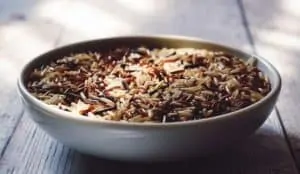Archives

Watch What You Eat
Of course if you eat a pasta dish packed with garlic or a hot dog loaded up with diced onions your breath is going to tell everyone you talk to what you had for lunch. But your diet can affect your breath long-term, too. Eating enough fresh and crunchy fruits and veggies such as apples, carrots, or celery regularly will help rub off any bad breath bacteria that may be sticking around on teeth.
Brush, Brush, Brush
Brushing your teeth for two minutes twice a day not only protects your pearly whites from decay and cavities, it also helps remove any bacteria that’s built up throughout the day (or night!). Besides brushing, flossing helps get rid of the more stubborn bacteria that have wiggled their way up under gums. Don’t forget about your tongue either. A gentle brush or a swipe of a tongue scraper will take care of any bacteria that’s left over.
Fight Off Dry Mouth
There are many things that can cause dry mouth including smoking, mouth breathing, and even certain medications. While dry mouth is uncomfortable, it may also a contribute to bad breath. When a mouth is dried out there’s not enough saliva to clean away bad breath bacteria, which builds up and gives off an unpleasant smell. To protect yourself from dry mouth and bad breath drink a lot of water, talk to your doctor about possibly using a different medication, and make a plan to quit smoking.
Stop Smoking
Speaking of quitting smoking, smokers tend to suffer from something known as smokers’ breath. This unique smell is caused by the tobacco itself and also from the chemicals found in cigarettes. These chemicals bring a stench all their own which lingers around even after someone is done smoking. Quitting can help your health in more than ways than helping freshen your breath. It can reduce your risk for heart disease and several types of cancer.
It Could Be More Than Just Bad Breath
Bad breath doesn’t only affect oral health. The truth is it can also be a sign of a problem somewhere else in the body. Not all bad breath smells the same, and different smells can indicate various health concerns. For example, a slight stench of ammonia may be a symptom of liver cirrhosis. Bad breath has been tied to many systemic diseases including kidney disease, cystic fibrosis, and respiratory infections.
Bad breath should be taken seriously. If it’s a chronic problem, you should see your dentist in Sparks as soon as possible.
Nobody should have to live with the embarrassment of bad breath or the fear that it’s a sign of something serious. Our dental office in Sparks can help. We encourage you to give us a call to schedule an appointment with our trusted team today. We’ll talk with you about your health history, habits, and discuss the best solutions to get rid of your bad breath.

Whole Grains Protect Teeth, Too
Whole grains can be great for our hearts and may even help reduce the risk of obesity and cancer. But recent research shows that eating the recommended daily dose of whole grains can protect oral health, too. Foods rich with whole grains are loaded with vitamins, minerals, and antioxidants that work to keep mouths healthy.
- Magnesium – Magnesium works with calcium to build strong teeth and strengthen enamel to protect them against bacteria and decay.
- Vitamin E – One of the main functions of vitamin E is to reduce inflammation. This is important in the fight against gum disease. Research shows a positive correlation between high inflammation levels and the risk for developing gum disease, a vitamin E can help keep inflammation levels low.
- B Vitamins – A variety of B vitamins found in whole grains are beneficial to oral health by lowering the risk of developing mouth sores or canker sores and fighting off bad breath. Some studies also show a positive correlation that certain B vitamins can protect against cavities.
Recommended Daily Whole Grain Servings
The table below shows the recommended daily servings by age range and gender according to the 2015-2020 Dietary Guidelines for Americans.
| Age | Female | Male |
| 1-3 | 2 | 2 |
| 4-8 | 2.5 | 2.5 |
| 9-13 | 3 | 3.5 |
| 14-18 | 3.5 | 4 |
| 19-30 | 3.5 | 4.5 |
| 31+ | 3 | 4 |
Best Sources of Whole Grain
Eating enough whole grains doesn’t need to be difficult, and you don’t need to give up delicious foods like some people think. In fact, making small changes can go a long way in helping you and your family get your daily dose of whole grains.
- Swap your morning cereal for a whole grain option
- Use whole grain bread or wraps for sandwiches
- Try a dinner loaded with whole grains by buying whole grain pasta
- Instead of a side of potatoes, eat brown rice
- Choose whole wheat hamburger or hot dog buns instead of white bread
When shopping for foods high in whole grains look for the gold and black Whole Grain Stamp.
Eat Well, See Your Dentist
What we choose to eat has an effect on not only our overall health, but our oral health too. Your dentist in Sparks urges you to follow a well-balanced diet rich in whole grains, fresh fruits and vegetables, and plenty of water.
Eating well and seeing your dentist twice year can keep your smile healthy. Don’t put off your bi-annual dental checkup, call our Sparks dental office to schedule an appointment.
